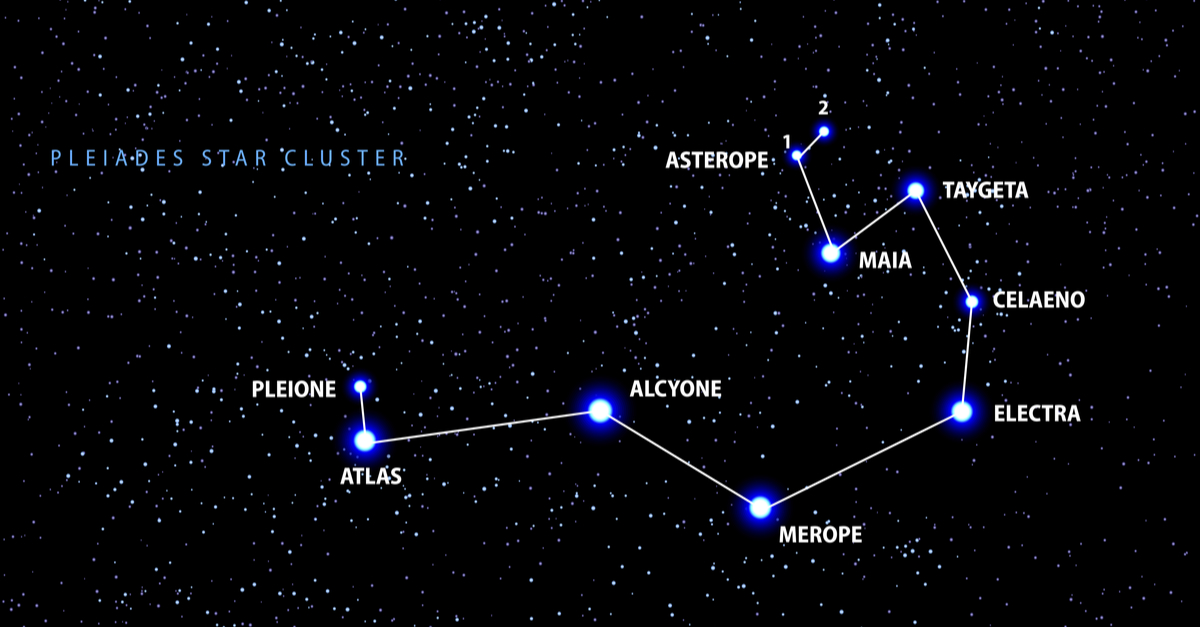The Pleiades Greek mythology story is one unlike the traditional ones you’ve seen on TV time and time again.
Unlike Zeus or Thor or Loki even, the story of Pleiades has many different variations and a series of plot holes.
What is the Pleiades?

The Pleiades is a cluster of over 1,000 stars existing in the Taurus constellation. The Pleiades star cluster consists of stars burning a vibrant blue suggesting the stars have been around for a very long time, at least 100 million years.
It is also known as Messier 45 or M45.
The Pleiades constellation exists over 400 light-years away from Earth in our remote past. As we look at Pleiades now, we can are looking at it as it existed hundreds of years ago.
Pretty fascinating huh?
The Pleiades is made up of nine different stars, seven of which are known fondly as The Seven Sisters. The names of all the stars are as follows:
- Atlas (the titan who carried the world on his back and father of the seven sisters)
- Pleione (sea nymph and mother of the seven sisters)
- Maia
- Elektra
- Sterope
- Alcyone
- Merope
- Taygete
- Celaeno
The Etymology of The Pleiades
There is massive debate and theory over the origination of the word “the Pleiades”.
- In some theories, the name “Pleiades” derives from their mother’s name, Pleione, and ultimately holds the meaning “daughters of Pleione”.
- There is also debate that the Pleiades comes from the Greek word “pleion” meaning “plenty” which would then suggest the word the Pleiades means “Ladies of Plenty”.
- Other theories suggest the word “Pleiades” also means “doves” in Greek.
When you look up in the sky to view the Pleiades, you’ll notice one of the stars is rather faint or doesn’t appear to be there at all. It is referred to as the Lost Sister or the Lost Pleiad.
I’ll get to explaining this part of the story later.
The Story of the Seven Sisters

When I was a young girl, the myth around the Seven Sisters had little to do with the Greek myth story itself and was a more tall tale of seven women who ate too many onions.
That’s right. They found a delicious vegetable, dug it up, and ate a ton of them.
In fact, they ate so many onions, they started to smell and their husbands complained. They believed the onion smell was affecting their ability to sleep so they could hunt.
In reference to the lost sister, or lost pleiad, another variation of the Seven Sisters story suggests that not all the women ate too many onions. It suggests one sister ate too many onions, so she was cast out by the other six sisters for smelling foul.
It’s for this reason some people call the faintest star, the lost sister, or the lost pleiad.
The Pleiades Greek Mythology Story

There is so much to the Pleiades Greek mythology. It appears to be all over the place and doesn’t follow a very strict timeline.
While their story has rarely been mentioned as frequently in film and other narratives, the Pleiades myth connects to a lot of well-known Greek Gods you most definitely have heard of.
According to Wikipedia,
Several of the most prominent male Olympian gods (including Zeus, Poseidon, and Ares) engaged in affairs with the seven heavenly sisters. These relationships resulted in the birth of their children.
The Wives of Greek Gods
If you didn’t know before or haven’t paid attention to Greek Gods and their respective wives, you’ll notice below the women noted in this star cluster are actually married to some of the Greek Gods we know and love.
Below you’ll find that Zeus and Poseidon took more than one sister as their wife, having at least one child with each.
- Maia mother of Hermes by Zeus.
- Electra mother of Dardanus and Iasion, by Zeus.
- Taygete mother of Lacedaemon, also by Zeus.
- Alcyone mother of Hyrieus, Hyperenor, and Aethusa by Poseidon.
- Celaeno mother of Lycus and Nycteus by Poseidon; and of Eurypylus also by Poseidon, and of Lycus and Chimaereus by Prometheus.
- Sterope mother of Oenomaus by Ares.
- Merope wooed by Orion. In other myths, she married Sisyphus becomes mortal, and had several sons with him before fading away,
Orion’s Pursuit of the Seven Sisters and How They Ended up in the Sky.
For a long while, the famous Orion (a Boeotian giant) that you can view in the sky each night, chased all the sisters and tried to woo them. He chased them for seven years before Zeus made them into stars.
According to Wikipedia,
Zeus transformed them first into doves, and then into stars to comfort their father. The constellation of Orion is said to still pursue them across the night sky.
It was said that the sisters ended up in the sky because they held terrible grief over the loss of their father, Atlas, or the loss of their half-sisters, Hyades. These half-sisters were fathered by Atlas and either the mother Aethra or one of the Oceanides.
The Pleiades Greek mythology suggests that the sisters committed suicide and thus found their places amongst the stars.
Regardless of their immortalized placement in the sky, courtesy of Zeus, the Seven Sisters are said to still be pursued this day by persistent Orion.
The Lost Pleiad
The Lost Pleiad is an interesting part of the Pleiades Greek mythology because of how many different variations there are. The Lost Pleiad is also a story not widely referenced in Greek mythological history.
If we’re looking at the story as regarded in the Seven Sisters myth, the Lost Pleiad simply ate too many onions. But in the other myths, The Lost Pleiad had a much sadder Greek story.
You see, the Lost Sister fell in love with dear Sisyphus, the founder, and King of Ephyra. If you don’t know the story of Sisyphus, he was punished by Zeus for cheating death twice and forced to push a boulder up a hill in Hades. Ares, God of War came to aid in the death of Sisyphus.
Sisyphus was known to be clever, charming, but also a liar, a master thief, and a trickster in many myths.
Beyond that, Sisyphus was mortal. And the only sister who married him was Merope, the fading star, the Lost Pleiad. All of the other sisters bore children by Gods, except for Merope.
The Lost Pleiad myth suggests that Merope was ashamed of her love for a mortal, which is why she appears to the faintest star in the sky.




